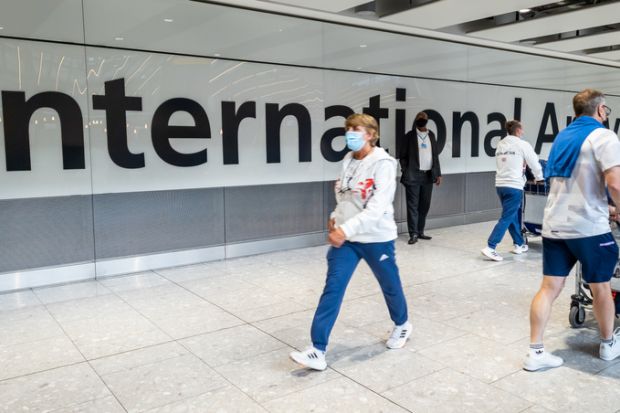UK universities would be much better equipped to deal with any issues presented by an influx of international students bringing dependants with them if the Home Office shared more visa data with providers, leaders have said.
With Prime Minister Rishi Sunak's government widely expected to announce restrictions on dependants in the coming days, universities say they are not told by UK Visas and Immigrations (UKVI) how many relatives are linked to applicants planning on studying at their institutions.
A record number of dependants were granted UK visas alongside students last year, with a further rise expected when the next set of migration figures are announced this week.
Recent reports have suggested the government was planning to either ban one-year foreign postgraduate taught students from bringing relatives with them to the UK, or that the same rules would be applied to all foreign university students on courses below PhD level.
“It’s obvious that the rise in the number of dependants has exceeded planning assumptions in government,” Jamie Arrowsmith, director of Universities UK International (UUKi), told Times Higher Education.
“While this may cause local challenges around, for example, access to accommodation, better sharing of data between UKVI and universities would make it easier for institutions to work with local communities to manage and address these concerns collaboratively.”
Mr Arrowsmith said prospective students thinking of applying to UK universities should have clarity and certainty because “constant changes to rules are deeply unhelpful to everyone”.
Wendy Alexander, Scotland’s former minister for enterprise and lifelong learning, has also called for greater transparency. Speaking at the launch last week of a new paper that showed international students contribute £41.9 billion a year to the UK economy, she said: “The government’s stance on denying universities and local authorities data on dependants is the very antithesis of joined-up government.
“The starting point for solutions and solving new student challenges is sharing data with local authorities and universities, and introducing a proper planning function around new student flows,” said Professor Alexander, now vice-principal (international) at the University of Dundee. She called for the Home Office to mandate the modelling of place-based demand for accommodation with providers and local authorities.
Home Secretary Suella Braverman has been pushing for new restrictions after previously claiming family members were “piggybacking” on student visas and were “not contributing to growing our economy”. But colleagues around the cabinet table – including education secretary Gillian Keegan – were said to be resisting the moves.
Sir David Bell, vice-chancellor of the University of Sunderland, echoed calls for more information on dependants from the Home Office because providers currently did not know how many were coming, even after enrolment, unless the student told them.
Dr Gavan Conlon, partner at the consultancy firm London Economics, said better information would allow universities to make better decisions.
“Providing additional information about the number of dependants that are turning up to a particular institution would help universities plan and accommodate those individuals and their dependants, and probably would reduce some of the more problematic local impacts that seem to be occurring at the moment unnecessarily,” he added.
London Economics partnered on the recent study, published jointly by UUKi, the Higher Education Policy Institute (Hepi) and Kaplan International Pathways, which revealed that the number of dependants per 1,000 non-EU students had increased from approximately 61 per 1,000 students in 2017-18 to 216 per 1,000 in 2021-22.
Despite this rise and the resulting increase in the cost of providing public services associated with it, the report found the net economic impact on the UK per non-EU student continued to be “very substantial”.
Sector leaders have today launched a publicity campaign called #WeAreInternational, aimed at raising awareness of the benefits international students bring to the country.
Dr Conlon said the floated suggestion from ministers was slightly excessive and would run counter to the previous targets of the government and its principles of promoting the global UK brand.
“There are issues at the margin in some areas as a result of having an increased number of dependants, but it’s still the case that the economic benefits significantly outweigh the economic costs. It seems like an act of economic self-harm to unnecessarily clamp down or reduce what is seen internationally as a success story,” he said.
A government spokesman said there was nothing preventing individual institutions from asking students if they were bringing dependants with them.
He said the country’s points-based system was designed to be flexible according to the UK’s needs, including attracting top-class talent from across the world to contribute to the UK’s excellent academic reputation.




